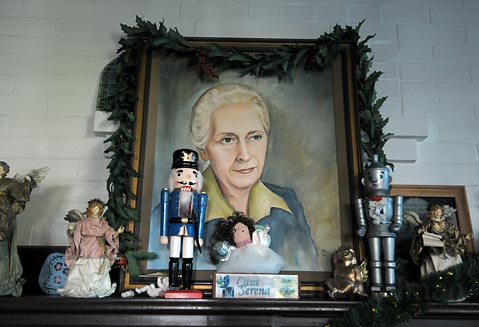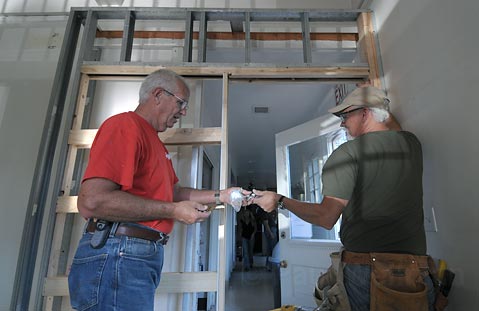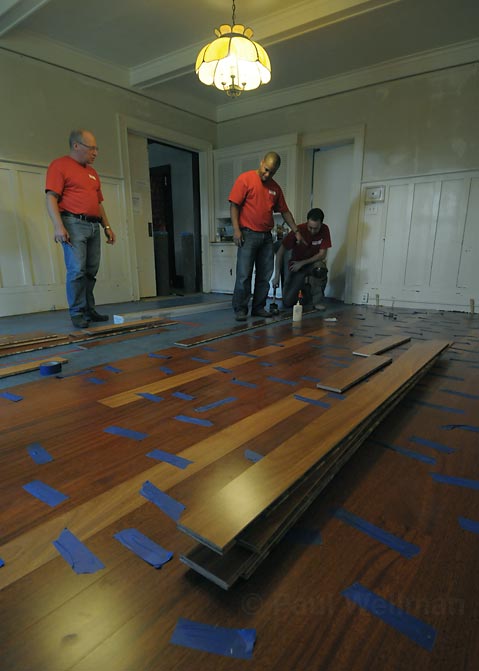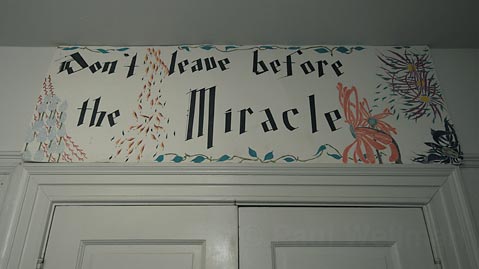Healing with Heart Hats
Company Donates Labor to Renovate Casa Serena

Casa Serena, a residential treatment home for women recovering from alcohol and drug addiction, celebrated its 50th anniversary in style this month: Volunteers from McCarthy Building Company donated their time to renovating the facility, as part of the company’s Heart Hats program.
The remodel held special meaning for residents, who cite the historic building’s homey atmosphere as a vital part of their recovery process. Graduate Liz H., quoted in a brochure from the Casa, described the environment this way: “We lived as a family in what came to be our home.”

McCarthy, the nationwide construction firm responsible for recent projects at Cottage Hospital, extended its stay in town for some holiday-season philanthropy after receiving a call from Casa Serena Development Director Jessie Stone. Stone and her colleagues thought a makeover of Casa Serena’s houses would be a meaningful way to commemorate the nonprofit’s half-century of dedication to recovering women, but were faced with a limited budget after state funding cuts. Community support provides much of Casa Serena’s funds but is largely allocated for scholarships for patient treatment, leaving little to cover high maintenance costs.

Undaunted, Stone contacted local construction businesses in search of a compassionate company willing to donate its labor. John Birch, project director for the hospital expansion, responded by recruiting a team of 29 to revamp Casa Serena’s Main House and Grad House facilities.
McCarthy’s Heart Hats program inspires “employees’ volunteer efforts in a variety of causes to ensure real needs are being met in communities where employees work, live, and play,” states a press release. The team at Casa Serena, revealed Birch, was composed not of tradespeople, but of McCarthy management stepping out of their usual job description. “The point is for the management to do something for the community,” he said, joking. “It’s the first time they’ve seen me in a pair of jeans.”

Last week, I witnessed men and women in their Heart Hats at work on Main House, a two-story home built in 1879 with an inviting wide porch (complete with swing) and lush garden. Amid the bustle and noise of the remodel, I felt the tranquility implied by the organization’s name. I observed Main House’s women enjoying coffee and conversation in the sunny kitchen and appreciated how much this wonderful old house contributed to these women’s healing. I felt the sense of camaraderie among them, described by graduate Jeri B. thusly: “I remembered the house being warm. It was a place where I felt I could at last belong.”
I understood Stone’s perspective, when she said, “Making this place beautiful will have an impact on women’s lives. So much of the process takes place in the home.” McCarthy staff, too, recognized the importance of a lovely and livable space for women recovering from addiction. Pausing from her work laying the planks of the dining room floor, McCarthy project accountant Debbie Eskenazi remarked, “Where these women live has to be a beautiful place.” In addition, Stone appreciated that McCarthy workers “took the time to make it safer and more functional.”
Casa Serena was founded in 1959 by Mildred Pinheiro, a recovering addict herself. Stone considers Pinheiro a “revolutionary” for taking on such a project during a time when “there wasn’t a lot of talk about women and addiction.” Fifty years later, Casa Serena houses women at three sites and has guided an estimated 10,000 women on their path to sobriety. Most residents are South County residents and are often referred to Casa Serena by other organizations, such as Child Welfare.

The Main House was the original site of Casa Serena, and currently hosts women during the first segment of their recovery. Here, said Stone, “Eighteen women are on the same page for three months,” in a structured healing program consisting of individual and group therapy sessions led by licensed marriage and family therapists, plus classes in parenting education, career counseling, and domestic violence education. Beyond these classes, women participate in other wellness activities like yoga and art therapy.
Graduates of the program at Main House can move on to Grad House, on Castillo, for an additional nine months of guidance toward recovery. Oliver House, located on the Mesa, is a reunification site where mothers “learn how to be mothers again.” Women may live at Oliver House, together with their young children, for up to two years.
Near the end of my tour of Casa Serena, Stone showed me one of Main House’s meeting rooms, frequent site of intense therapy sessions, which was without a door until the renovation. The privacy offered by the new door will make women feel safer during sessions, Stone believes. The door is a perfect example of how McCarthy employees’ volunteer efforts directly affect the recovery of the women at Casa Serena.



